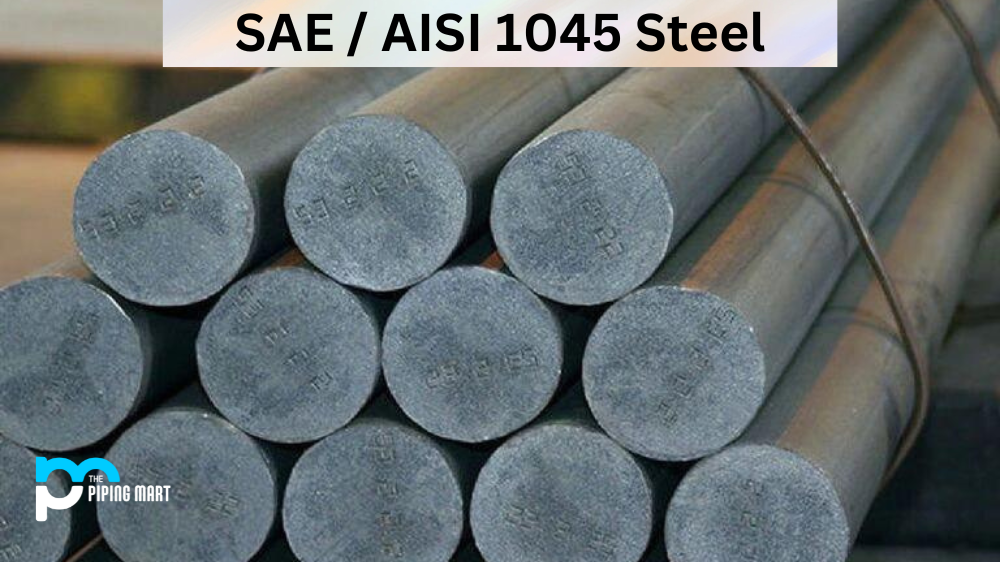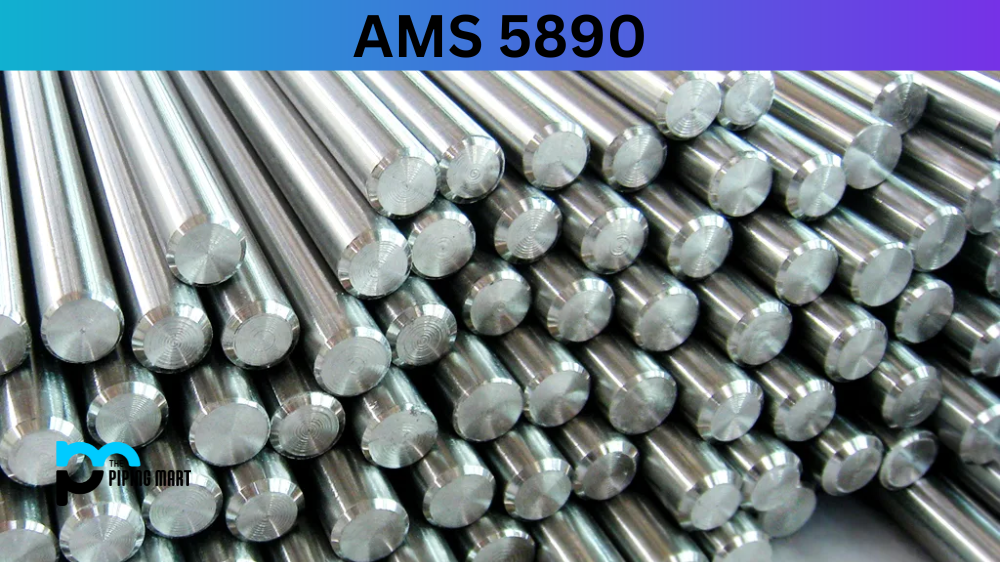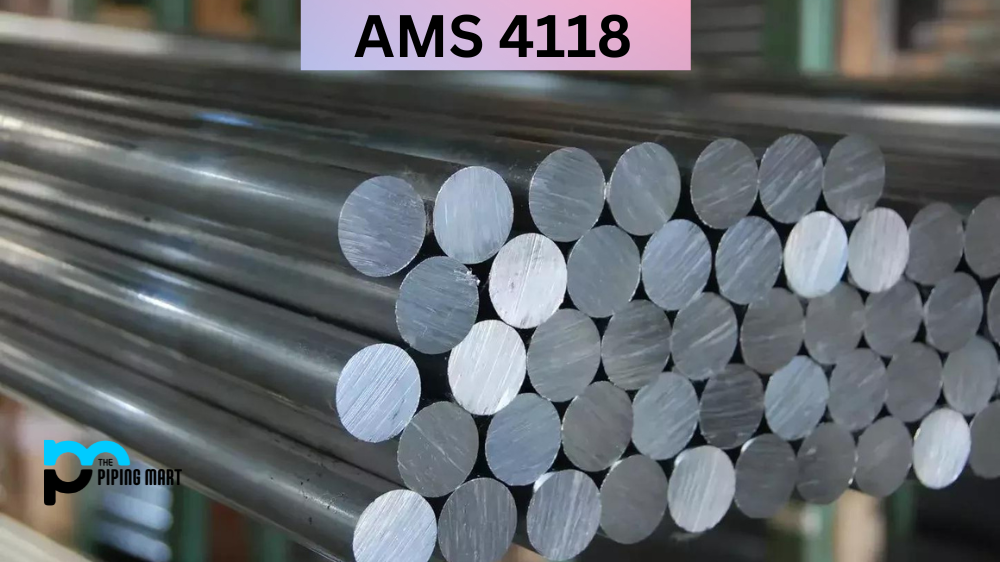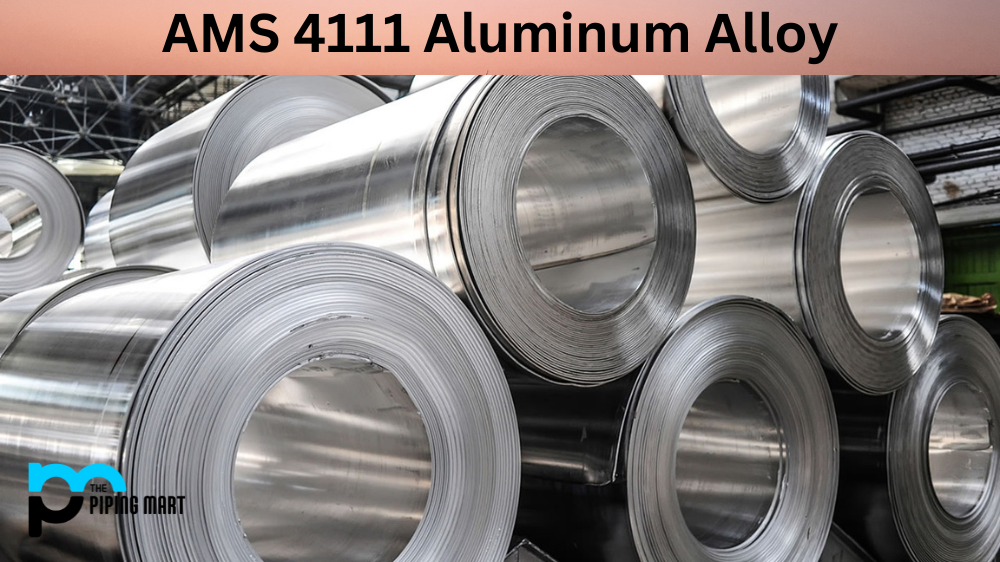SAE/AISI 1045 steel is a medium carbon steel that is used in a variety of industries and applications. The corrosion resistance, heat resistance, and machinability make it a versatile material that can be used in a wide range of applications. In this blog post, we will take a closer look at the properties of SAE / AISI 1045 steel and its uses.
AISI 1045 Composition
| Element | Content |
|---|---|
| Carbon, C | 0.420 – 0.50 % |
| Iron, Fe | 98.51 – 98.98 % |
| Manganese, Mn | 0.60 – 0.90 % |
| Phosphorous, P | ≤ 0.040 % |
| Sulfur, S | ≤ 0.050 % |
AISI 1045 Physical Properties
| Physical Properties | Metric | Imperial |
|---|---|---|
| Density | 7.87 g/cc | 0.284 lb/in3 |
AISI 1045 Mechanical Properties
| Mechanical Properties | Metric | Imperial |
|---|---|---|
| Hardness, Brinell | 163 | 163 |
| Hardness, Knoop (Converted from Brinell hardness) | 184 | 184 |
| Hardness, Rockwell B (Converted from Brinell hardness) | 84 | 84 |
| Hardness, Vickers (Converted from Brinell hardness) | 170 | 170 |
| Tensile Strength, Ultimate | 565 MPa | 81900 psi |
| Tensile Strength, Yield | 310 MPa | 45000 psi |
| Elongation at Break (in 50 mm) | 16.0 % | 16.0 % |
| Reduction of Area | 40.0 % | 40.0 % |
| Modulus of Elasticity (Typical for steel) | 200 GPa | 29000 ksi |
| Bulk Modulus (Typical for steel) | 140 GPa | 20300 ksi |
| Poissons Ratio (Typical For Steel) | 0.290 | 0.290 |
| Shear Modulus (Typical for steel) | 80 GPa | 11600 ksi |
AISI 1045 Thermal Properties
| Properties | Metric | Imperial |
|---|---|---|
| Thermal conductivity | 51.9 W/mK | 360 BTU in/hr.ft2.°F |
| Thermal expansion co-efficient (@0.000-100°C/32-212°F) | 11.2 µm/m°C | 6.22 µm/m°C |
AISI 1045 Equivalent
| AFNOR XC 42 TS | AFNOR XC 45 | AFNOR XC 48 | AFNOR XC42 |
| DIN 1.1191 | JIS S 45C | JIS S 48 C | SS 1672 |
| ASTM A29 | ASTM A510 | ASTM A519 | ASTM A576 |
| FED QQ-S-635 (C1045) | FED QQ-S-700 (1045) | SAE J403 | ASTM A682 |
| SAE J414 | ASTM A183 (2-Nuts) | ASTM A236 (1045) | SAE J412 |
| ASTM A266 (1045) | ASTM A827 | ASTM A830 | QQ S700 (C1045) |
| SAE J1397 (1045) |
AISI 1045 Uses
These properties make SAE 1045 steel a versatile material that can be used in a wide range of industries and applications. Some of the most common uses for SAE / AISI 1045 steel include:
- Construction
- Automotive
- Machining
- Welding
Heat Treatment
AISI 1045 steel can be heat treated to improve its strength and hardness. The heat treatment process involves heating the steel to above its critical temperature and then cooling it in water or oil. The resulting microstructure is a mix of ferrite and pearlite, which gives the steel good strength and toughness.
Corrosion Resistance
Alloy 1045 steel has excellent corrosion resistance, which makes it a popular choice for many industrial and commercial applications. It is highly heat treatable, and its exceptional strength makes it ideal for high-impact environments. The material’s chromium content helps it resist rust, even in salt or chlorine-exposed environments, such as those found in coastal areas. Additionally, AISI / SAE 1045 boasts a durable finish that prevents it from becoming tarnished or discoloured over time. Furthermore, the steel’s ability to be solidified gives it an extra layer of protection against corrosion while providing an attractive look. Its superior durability and dependability will ensure your product will last 1 or 2 generations down the road.
Heat Resistance
Grade 1045 is heat-resistant steel. It has good resistance to oxidation and can be used at high temperatures. It is often used in the aerospace industry.
Machining
Machining SAE/AISI 1045 is highly cost-effective due to its typical and widely available properties, such as hardness and strength. This medium-carbon steel contains 0.45% carbon content, making it relatively inexpensive compared to other steels with similar strength characteristics. The versatile material creates a lot of options for heat treatment, making it an ideal choice for turned, milled, drilled and tapped components. With quality Machining techniques and a consistent plan of attack, 1045 can be machined into complex parts with fine tolerances and low surface roughness values. By ensuring the tooling is sharp and of the correct shape, SAE/AISI 1045 can be easily worked on while yielding optimal results.
Welding
Welding SAE/AISI 1045 steel can be done both manually, as well as with machine welding. This type of steel is one of the stronger and higher-grade grades, so it’s important to always have the right tools for this project. It’s important to preheat the material before welding and then use a post-heating for tension-relieving carbon parts. To ensure strong welds, use an appropriate gas and an arc voltage regulator to make sure it stays within the specified range. Finally, consider stress relief treatments when operating on thicker plates, as they require more energy input and could cause warping. With the right technique and materials in hand, successful SAE / AISI 1045 welding projects are definitely achievable.
Conclusion
SAE / AISI 1045 is a versatile material that can be used in a wide range of industries and applications. The good corrosion resistance, heat resistance, and machinability make it an ideal choice for many different projects. If you are looking for a material that can do it all, SAE / AISI 1045 is a perfect choice.

Abhishek is a seasoned blogger and industry expert, sharing his insights and knowledge on various topics. With his research, Abhishek offers valuable insights and tips for professionals and enthusiasts. Follow him for expert advice on the latest trends and developments in the metal industry.




